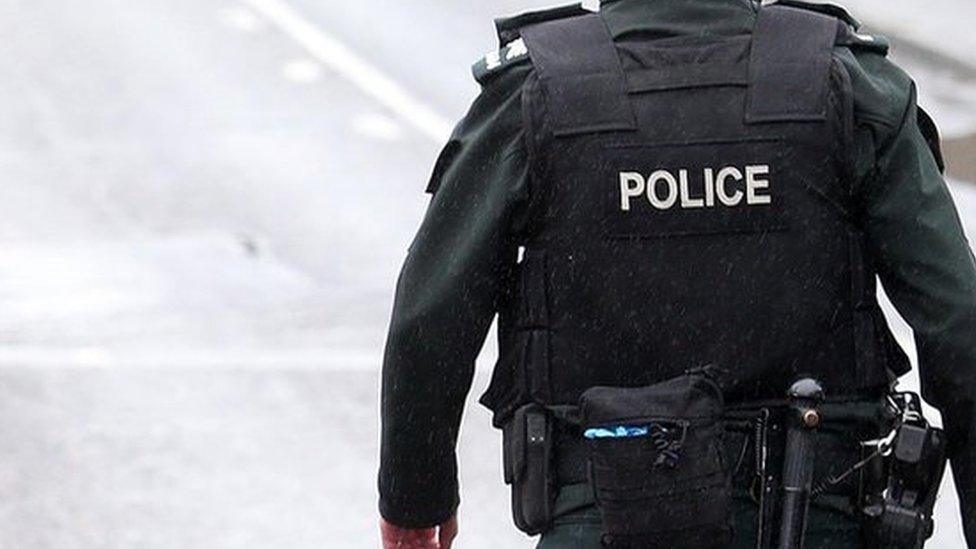Police misconduct hearings 'should be in public'
- Published

The Policing Board said it was aware of the difficulties public hearings would pose in Northern Ireland
Changes to police disciplinary processes, including holding officer misconduct hearings in public, should be considered, a review by the Policing Board has suggested.
It follows cases of sexual harassment and misogyny highlighted by the media.
The board has written to the Department of Justice (DoJ) making a number of recommendations that would require legislative change.
It also urged the police to make "better use" of its sacking powers.
After a review of professional standards, the board has made six recommendations for improvement.
They include having disciplinary panels chaired by a legally-qualified person, instead of an assistant chief constable, as happens presently.
Police Service of Northern Ireland (PSNI) Deputy Chief Constable Mark Hamilton said the report and recommendations were welcomed.
He said they had highlighted a "number of areas where changes to the current police misconduct systems will improve performance" as well as helping to improve public confidence in policing.
'Aware of difficulties'
The board also stated holding proceedings in public, as happens in other parts of the UK, "should be explored".
It said: "This can be beneficial in sending out a clear message to other officers and the public on what behaviour is expected of officers and also the sanctions imposed.
"Whilst there is no doubt as to the benefits of hearings in public, the board is aware of the difficulties this would pose in Northern Ireland."
The board also recommended the police make "better use" of existing powers to dismiss new recruits if behavioural issues arise during their probationary periods.
It called for quicker disciplinary processes and for investment in the police professional standards department.
The board noted there had been recent improvement around vetting procedures.
The review followed concerns raised within the police and by the media.
It made reference to the case of Sinead McGrotty, a civilian employed by the police, who said she was let down after making allegations of sexual assault against an officer.
Speaking to BBC Radio Ulster's Talkback programme, Ms McGrotty said the police misconduct system "has to be modernised".
She welcomed the review's recommendation to replace the assistant chief constable as chair of misconduct proceedings.

The police officer in Sinead McGrotty's case was find £250 after accepting an allegation of inappropriate touching
"For the service to have a legal representative chairing it, it's going to stop the organisation being vulnerable to litigation," she said.
"It's also going to save the taxpayers an awful lot of money in the long run for financial settlements if things are worked out earlier."
BBC Northern Ireland's Spotlight programme also exposed a group of 20 officers who were exchanging sexist, pornographic and racist messages.
The PSNI has also been engaged in an internal review of vetting and whistle-blowing arrangements in the wake of the murder of Sarah Everard in London.
'Isn't a runner'
The chair of the Policing Board Doug Garrett said: "The board is mindful of the negative impact this issue has had on both public confidence in policing and the reputation of the PSNI.
"In the course of this review, the board has recognised the significant efforts being made by the PSNI leadership to make sure all police staff are aware of the standards and behaviours expected within the service."
Mark Hamilton of the PSNI added that the board had acknowledged the work police had already carried out in "raising awareness within the service of the standards and behaviours expected of our officers and staff".
"The Police Service of Northern Ireland expects the highest standards of professionalism and integrity from all of our police officers and staff," said the deputy chief constable.
He said breaches of the law and the code would be "thoroughly investigated and robustly dealt with" in accordance with the police procedures.
"We are currently considering the recommendations for improvement made by the board and we will work with them to set out our implementation plan moving forward," he said.
Liam Kelly, from the Police Federation for Northern Ireland, said the recommendation to explore holding disciplinary hearings in public would expose officers to unacceptable risks.
He said there are "some meaningful and sensible steps that could be taken to expedite hearings" but "the recommendation to ape what happens in England and Wales simply isn't a runner".
"Only recently, we witnessed an attack on two young officers in Strabane and a further cowardly attempt on colleagues in Derry-Londonderry," he added.
He said the representative body was "willing to engage with the Policing Board and the PSNI to devise and implement steps that are progressive and are not fanciful".
Related topics
- Published3 November 2021

- Published5 October 2021
